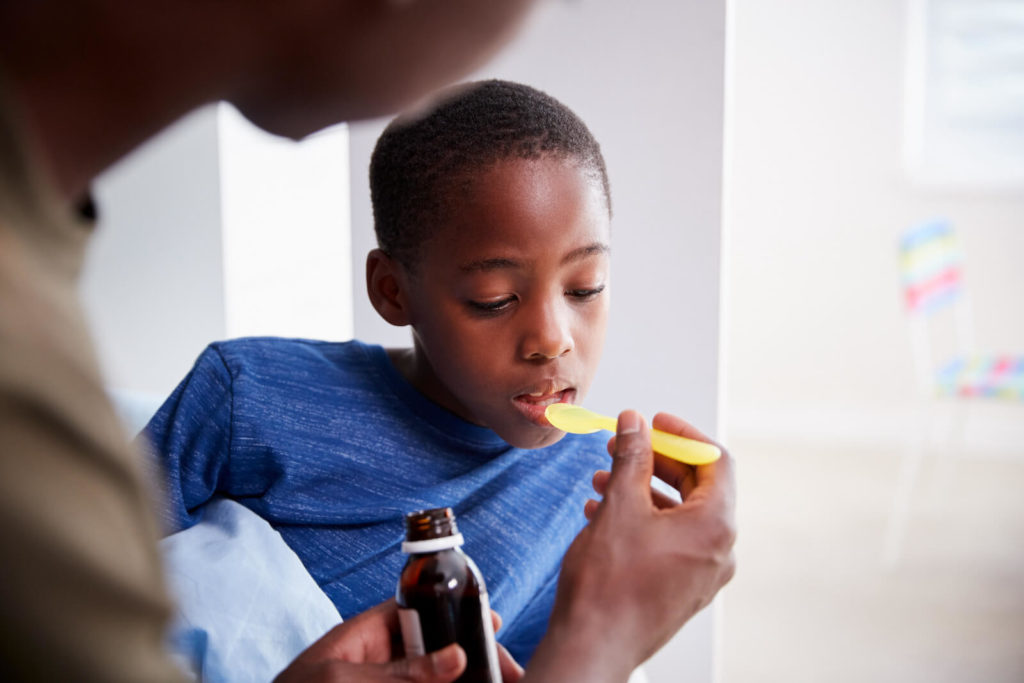How to Choose a Kids Probiotic for Your Little One
Kids Probiotics Benefits, Dosing, and Best Options
- Probiotics for Kids|
- Specific Kids Probiotics|
- Benefits of Probiotics for Kids|
- How to Choose|
- Bottom Line|

Here is an overview of all the ways probiotics can help your child:
- Improved diarrhea, constipation and reflux
- Reduced colic
- Reduced risk of upper respiratory tract infection
- Reduced seasonal allergies
- Improved dairy tolerance
If you’re looking into starting your little one on probiotics, we have good news: Multiple different kinds of probiotics have been shown to be both beneficial and safe for kids of all ages, including most preterm infants.
In other words, there’s no one “kids probiotic” that’s better than the rest. Probiotics across various categories, species, and strains are all beneficial to children (including the kinds you may take yourself). It’s more a matter of enticing them to take it and providing it to them in a form that they will accept (probiotic gummies, liquid, chewable tablets, etc).
In this article, we’ll go over tips for choosing high quality probiotics, break down the various research-backed benefits of probiotics for kids, including for gut infections, diarrhea, ear infections, skin conditions, and more. We’ll also review dosage, safety considerations, and one or two conditions where research hasn’t shown benefits for kids (like constipation).
Probiotics for Kids

Probiotics across all three categories have been shown to be safe and beneficial for kids (and even babies and infants), with the most research on category one probiotics (lactobacillus and bifidobacterium blends). The three categories are:
- Lactobacillus and bifidobacterium species
- Saccharomyces boulardii (fungal probiotic)
- Soil-based probiotics
In all likelihood, the probiotics in your local health food store labeled specifically for kids will fall into the first category, as those are the most common (and the most studied) on the market [1]. This is true for adult probiotics as well.
There Aren’t Specific ‘Kids Probiotic’ Strains or Species

Importantly, the biggest differences between kids probiotics and adult probiotics are the packaging and the delivery mechanism. Kids probiotics are more likely to come in colorful packaging and have gummies, liquid, or chewable options than adult probiotics. There are also dosing variations, which we’ll get into later. But otherwise, the ingredients inside the pill are the same.
In other words, kids probiotics and adult probiotics use the same species and strains. Of course, you should always talk to your pediatrician before adding probiotics into your child’s health care regimen, but in general, kids probiotics are safe.
Note: Kids probiotics still need to be refrigerated unless the label says otherwise, just like the adult version.
Benefits of Probiotics for Kids

In general, probiotic foods and dietary supplements benefit human health by enhancing the total number and variety of good bacteria and fungal species in the gut microbiome [2]. With greater biodiversity in the gut comes a more robust immune system, a stronger digestive system (reduced digestive tract permeability/leaky gut), a reduced risk of autoimmunity, and lower levels of chronic inflammation in the body [2, 3, 4]. All of this is true for children and babies as well as adults.
Specifically, kids can benefit from probiotic supplements in a number of ways as early as infancy.
- A systematic review of 20 randomized controlled trials showed that infants given probiotics were less colicky and irritable, had less diarrhea, fewer spitting episodes, and fewer respiratory infections [1].
Probiotics have also been shown to help prevent serious GI illnesses in premature, low birth-weight babies as well as improving lactose tolerance and symptoms of IBS (irritable bowel syndrome) [5]. Risk of candida overgrowth — a fungus that can result in thrush, facial rash, and diaper rash — can also be reduced with probiotics, as can risk of ear and respiratory infection in babies [6, 7].
Here are a few of the conditions kids probiotics have been shown to help with [8]:
- Acute gastroenteritis (both treatment and prevention)
- Antibiotic associated diarrhea (prevention)
- C. difficile associated diarrhea (prevention)
- Hospital related diarrhea (prevention)
- Infant colic (treatment and prevention)
- Regurgitation (treatment and prevention)
- IBS (treatment)
- Ulcerative colitis (treatment)
- H. pylori (treatment)
- Eczema (treatment and prevention)
Infections
Fighting infection requires robust immune health, which probiotics help boost. A systematic literature review (this is rigorous, high-quality research) showed that probiotics reduced the overall number of children taking antibiotics for any type of infection [9]. Specifically, research shows that probiotics can help reduce occurrences of ear infections, respiratory infections, and Giardia (parasite) infections [9, 10, 11, 12].
Diarrhea
Taking probiotics alongside antibiotics to treat H. Pylori (a severe bacterial infection that can result in stomach ulcers) has also been shown to reduce antibiotic-associated diarrhea and other side effects caused by antibiotics in children [13, 14].
Probiotics have also been used to help reduce the duration and recovery time of diarrhea for kids, regardless of the cause. Probiotics from all three categories have been studied independently to aid in treating diarrhea and reducing the duration of illness and recovery time. One study showed that category one (lactobacillus & bifidobacterium probiotics) was slightly more effective than category two, but all three categories seem to be worth trying [15, 16, 17].
There’s no research available that looks at more than one category used in a combined therapy, but our clinical practice sees vast improvements with a triple-therapy approach that includes probiotics from each of the three categories.
Allergies, Skin, and Autoimmunity
The use of probiotics has been shown to help adults reduce inflammation in autoimmune diseases like asthma, allergies, skin conditions, and Crohn’s disease. In children’s health, preliminary results are a bit more mixed, but some are promising.
There’s evidence to support the use of category 1 probiotics in the treatment of atopic dermatitis, especially in combination with eliminating cow’s milk [18, 19]. There’s also mixed research that suggests that probiotics could help prevent the formation of allergies in kids [20].
However, a clinical guide developed from a review of available literature suggests that there’s no conclusive evidence to support the use of probiotics in kids to help treat or prevent Crohn’s, asthma, or allergic rhinitis [8].
Kids Probiotics May Not Help With Constipation
One way in which probiotics don’t seem to be helpful in kids (though they’re helpful to adults) is to help relieve constipation [8]. While there’s no evidence that probiotics could make constipation in children worse, it’s worth noting that this area of digestive health may differ between adults in children when it comes to probiotics.
Probiotics Are Safe for Children and Infants
A significant amount of high quality research shows that probiotics are safe for children and infants — even preterm infants. A 2021 systematic review of 45 RCTs involving 12,320 preterm infants found that Lacto/Bifido probiotics (category 1) plus prebiotics were associated with lower rates of mortality, necrotizing enterocolitis (NEC), and NEC-related mortality [21]. This points to the safety and efficacy of probiotics in high-risk populations.
And while probiotics have been shown to be safe for premature infants in general, the exception may be premature infants who are very sick/critically ill (as well as individuals of all ages who are critically ill) [22]. Consult with a physician in these cases.
None of the studies we’ve reviewed show any serious or negative effects among children or infants. The NIH (National Institutes of Health) emphasizes the unlikelihood of experiencing negative effects from probiotics [23]. Probiotics are safe for mothers and infants during pregnancy and breastfeeding as well [24].
How to Choose a Kids Probiotic

When it comes to choosing the best probiotic for your child, you’ll want to choose a kids probiotic in much the same way you’d choose one for an adult. The best probiotics often have a variety of species in every dose and have a potency in the many billions of live cultures.
A number of probiotic strains and species have been studied in both kids and adults to treat or address particular health concerns or diseases. But there are literally thousands of them, most of which have not been compared to each other in clinical trials. Experts agree that ensuring variety is a lot more important than including one particular bacteria or fungal strain over another.
Many probiotic supplements also contain prebiotics. Prebiotics are types of fiber that feed beneficial bacteria (probiotics). Examples of prebiotics that you might see on the label include inulin, chicory, oat fiber, apple or pear pectin, and any word that has the suffix “-oligosaccharides” in it. Prebiotics help strengthen the bacteria in your gut, so it’s good to look for probiotics that include them.
Importantly, when choosing a supplement to benefit your child’s health and wellness, you should think about the non-nutritive ingredients as well. Avoid probiotics with artificial colors, sweeteners, preservatives, or flavors. A probiotic with berry flavor is best if it includes juice from real berries, for example. If your child is dealing with allergies or if you have allergies or autoimmunity in your family, look for a gluten-free probiotic to avoid introducing potential irritants.
You can talk to a healthcare professional to ask if there’s a brand that they recommend most.
Dosage for Kids
While there isn’t enough research available to identify an ideal dose of probiotics for kids, a 2021 comprehensive literature review found the following overall [8]:
- The range of doses of lactobacillus and bifidobacterium species successfully used in children and infants was 100 million to 1 trillion (but mostly 100 million to 10 billion) CFUs/day.
- The range of doses of lactobacillus and bifidobacterium species used specifically for infants was 100 million to 20 billion (but mostly less than 10 billion) CFU/day.
- The range of saccharomyces boulardii used successfully in children and infants was 250-750 (but mostly 250-500) mg/day.
- There was not enough research on soil-based probiotics for kids to identify a beneficial dose range. Starting with the lowest available dose and/or consulting with a practitioner may be best.
While many studies show the use of lower doses of probiotics for kids than for adults, there’s no evidence that a higher dose could be damaging or dangerous. Another review of the literature suggests that a probiotic containing roughly 10 billion CFU (colony forming units) per day is a good place to start for kids [25].
Bottom Line: Probiotics are Safe (and Beneficial) for Kids

It’s absolutely understandable to be concerned about giving something new to your little one. It’s our goal to relieve your concerns by presenting sound evidence that probiotics are safe for kids and offer a number of benefits, including immune support, digestive support, and potential relief from infections, allergies, and skin problems.
Pediatric doctors recommend probiotics to children, babies, pregnant and nursing mothers, and even some premature infants. Talk to your child’s doctor before starting something new, or reach out to our clinic to talk to one of our functional medicine doctors.
Dr. Michael Ruscio is a DC, natural health provider, researcher, and clinician. He serves as an Adjunct Professor at the University of Bridgeport and has published numerous papers in scientific journals as well as the book Healthy Gut, Healthy You. He also founded the Ruscio Institute of Functional Health, where he helps patients with a wide range of GI conditions and serves as the Head of Research.➕ References
- Skórka A, Pieścik-Lech M, Kołodziej M, Szajewska H. To add or not to add probiotics to infant formulae? An updated systematic review. Benef Microbes. 2017 Oct 13;8(5):717–25. DOI: 10.3920/BM2016.0233. PMID: 28856907.
- Leblhuber F, Steiner K, Schuetz B, Fuchs D, Gostner JM. Probiotic Supplementation in Patients with Alzheimer’s Dementia – An Explorative Intervention Study. Curr Alzheimer Res. 2018;15(12):1106–13. DOI: 10.2174/1389200219666180813144834. PMID: 30101706. PMCID: PMC6340155.
- Toribio-Mateas M. Harnessing the power of microbiome assessment tools as part of neuroprotective nutrition and lifestyle medicine interventions. Microorganisms. 2018 Apr 25;6(2). DOI: 10.3390/microorganisms6020035. PMID: 29693607. PMCID: PMC6027349.
- Lamprecht M, Bogner S, Schippinger G, Steinbauer K, Fankhauser F, Hallstroem S, et al. Probiotic supplementation affects markers of intestinal barrier, oxidation, and inflammation in trained men; a randomized, double-blinded, placebo-controlled trial. J Int Soc Sports Nutr. 2012 Sep 20;9(1):45. DOI: 10.1186/1550-2783-9-45. PMID: 22992437. PMCID: PMC3465223.
- Dermyshi E, Wang Y, Yan C, Hong W, Qiu G, Gong X, et al. The “Golden Age” of Probiotics: A Systematic Review and Meta-Analysis of Randomized and Observational Studies in Preterm Infants. Neonatology. 2017 Feb 15;112(1):9–23. DOI: 10.1159/000454668. PMID: 28196365.
- Manzoni P, Mostert M, Leonessa ML, Priolo C, Farina D, Monetti C, et al. Oral supplementation with Lactobacillus casei subspecies rhamnosus prevents enteric colonization by Candida species in preterm neonates: a randomized study. Clin Infect Dis. 2006 Jun 15;42(12):1735–42. DOI: 10.1086/504324. PMID: 16705580.
- Rautava S, Salminen S, Isolauri E. Specific probiotics in reducing the risk of acute infections in infancy–a randomised, double-blind, placebo-controlled study. Br J Nutr. 2009 Jun;101(11):1722–6. DOI: 10.1017/S0007114508116282. PMID: 18986600.
- Depoorter L, Vandenplas Y. Probiotics in pediatrics. A review and practical guide. Nutrients. 2021 Jun 24;13(7). DOI: 10.3390/nu13072176. PMID: 34202742. PMCID: PMC8308463.
- Scott AM, Clark J, Julien B, Islam F, Roos K, Grimwood K, et al. Probiotics for preventing acute otitis media in children. Cochrane Database Syst Rev. 2019 Jun 18;6:CD012941. DOI: 10.1002/14651858.CD012941.pub2. PMID: 31210358. PMCID: PMC6580359.
- Wang Y, Li X, Ge T, Xiao Y, Liao Y, Cui Y, et al. Probiotics for prevention and treatment of respiratory tract infections in children: A systematic review and meta-analysis of randomized controlled trials. Medicine (Baltimore). 2016 Aug;95(31):e4509. DOI: 10.1097/MD.0000000000004509. PMID: 27495104. PMCID: PMC4979858.
- Dinleyici EC, Eren M, Dogan N, Reyhanioglu S, Yargic ZA, Vandenplas Y. Clinical efficacy of Saccharomyces boulardii or metronidazole in symptomatic children with Blastocystis hominis infection. Parasitol Res. 2011 Mar;108(3):541–5. DOI: 10.1007/s00436-010-2095-4. PMID: 20922415.
- Besirbellioglu BA, Ulcay A, Can M, Erdem H, Tanyuksel M, Avci IY, et al. Saccharomyces boulardii and infection due to Giardia lamblia. Scand J Infect Dis. 2006;38(6–7):479–81. DOI: 10.1080/00365540600561769. PMID: 16798698.
- Fang H-R, Zhang G-Q, Cheng J-Y, Li Z-Y. Efficacy of Lactobacillus-supplemented triple therapy for Helicobacter pylori infection in children: a meta-analysis of randomized controlled trials. Eur J Pediatr. 2019 Jan;178(1):7–16. DOI: 10.1007/s00431-018-3282-z. PMID: 30446816.
- Li S, Huang X, Sui J, Chen S, Xie Y, Deng Y, et al. Meta-analysis of randomized controlled trials on the efficacy of probiotics in Helicobacter pylori eradication therapy in children. Eur J Pediatr. 2014 Feb;173(2):153–61. DOI: 10.1007/s00431-013-2220-3. PMID: 24323343.
- Zhang J, Wan S, Gui Q. Comparison of safety, effectiveness and serum inflammatory factor indexes of Saccharomyces boulardii versus Bifidobacterium triple viable in treating children with chronic diarrhea: a randomized trial. Transl Pediatr. 2021 Jun;10(6):1677–85. DOI: 10.21037/tp-21-195. PMID: 34295782. PMCID: PMC8261597.
- Mourey F, Sureja V, Kheni D, Shah P, Parikh D, Upadhyay U, et al. A Multicenter, Randomized, Double-blind, Placebo-controlled Trial of Saccharomyces boulardii in Infants and Children With Acute Diarrhea. Pediatr Infect Dis J. 2020 Nov;39(11):e347–51. DOI: 10.1097/INF.0000000000002849. PMID: 32796401. PMCID: PMC7556239.
- Sudha MR, Jayanthi N, Pandey DC, Verma AK. Bacillus clausii UBBC-07 reduces severity of diarrhoea in children under 5 years of age: a double blind placebo controlled study. Benef Microbes. 2019 Mar 13;10(2):149–54. DOI: 10.3920/BM2018.0094. PMID: 30638396.
- Tan-Lim CSC, Esteban-Ipac NAR, Recto MST, Castor MAR, Casis-Hao RJ, Nano ALM. Comparative effectiveness of probiotic strains on the prevention of pediatric atopic dermatitis: A systematic review and network meta-analysis. Pediatr Allergy Immunol. 2021 Aug;32(6):1255–70. DOI: 10.1111/pai.13514. PMID: 33811784.
- Cukrowska B, Ceregra A, Maciorkowska E, Surowska B, Zegadło-Mylik MA, Konopka E, et al. The Effectiveness of Probiotic Lactobacillus rhamnosus and Lactobacillus casei Strains in Children with Atopic Dermatitis and Cow’s Milk Protein Allergy: A Multicenter, Randomized, Double Blind, Placebo Controlled Study. Nutrients. 2021 Apr 1;13(4). DOI: 10.3390/nu13041169. PMID: 33916192. PMCID: PMC8066586.
- Wang HT, Anvari S, Anagnostou K. The role of probiotics in preventing allergic disease. Children (Basel). 2019 Feb 5;6(2). DOI: 10.3390/children6020024. PMID: 30764558. PMCID: PMC6406271.
- Chi C, Li C, Buys N, Wang W, Yin C, Sun J. Effects of Probiotics in Preterm Infants: A Network Meta-analysis. Pediatrics. 2021 Jan;147(1). DOI: 10.1542/peds.2020-0706. PMID: 33323491.
- Didari T, Solki S, Mozaffari S, Nikfar S, Abdollahi M. A systematic review of the safety of probiotics. Expert Opin Drug Saf. 2014 Feb;13(2):227–39. DOI: 10.1517/14740338.2014.872627. PMID: 24405164.
- Probiotics – Health Professional Fact Sheet [Internet]. [cited 2021 Jul 1]. Available from: https://ods.od.nih.gov/factsheets/Probiotics-HealthProfessional/
- Sheyholislami H, Connor KL. Are Probiotics and Prebiotics Safe for Use during Pregnancy and Lactation? A Systematic Review and Meta-Analysis. Nutrients. 2021 Jul 13;13(7). DOI: 10.3390/nu13072382. PMID: 34371892. PMCID: PMC8308823.
- Thomas DW, Greer FR, American Academy of Pediatrics Committee on Nutrition, American Academy of Pediatrics Section on Gastroenterology, Hepatology, and Nutrition. Probiotics and prebiotics in pediatrics. Pediatrics. 2010 Dec;126(6):1217–31. DOI: 10.1542/peds.2010-2548. PMID: 21115585.
Discussion
I care about answering your questions and sharing my knowledge with you. Leave a comment or connect with me on social media asking any health question you may have and I just might incorporate it into our next listener questions podcast episode just for you!